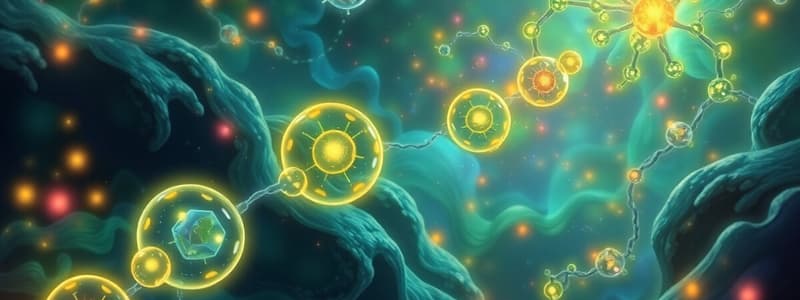Podcast
Questions and Answers
What is the boiling point mentioned for the compound?
What is the boiling point mentioned for the compound?
- 180°C
- 190°C
- 150°C (correct)
- 100°C
Which reaction do unsaturated compounds undergo?
Which reaction do unsaturated compounds undergo?
- Elimination reactions
- Dehydration reactions
- Addition reactions (correct)
- Substitution reactions
What product is formed on the thermal decomposition of terpenoid?
What product is formed on the thermal decomposition of terpenoid?
- Propylene
- Isoprene (correct)
- Ethanol
- Methane
Which chemical transformation involves the breaking of bonds in a compound?
Which chemical transformation involves the breaking of bonds in a compound?
What is the nature of the compounds mentioned in terms of their volatility?
What is the nature of the compounds mentioned in terms of their volatility?
Which of the following is an addition product formed from unsaturated compounds?
Which of the following is an addition product formed from unsaturated compounds?
In what phase can terpenoid products undergo polymerization?
In what phase can terpenoid products undergo polymerization?
What type of reactions do halogens undergo with unsaturated compounds?
What type of reactions do halogens undergo with unsaturated compounds?
Which method is NOT commonly used for the isolation of terpenoids?
Which method is NOT commonly used for the isolation of terpenoids?
What is the primary classification of meroterpenoids based on?
What is the primary classification of meroterpenoids based on?
Which triterpenoid exhibited significant cytotoxicity against the Hela human cancer cell line?
Which triterpenoid exhibited significant cytotoxicity against the Hela human cancer cell line?
Which spectroscopy technique is specifically used to detect the presence of hydroxyl groups in terpenoids?
Which spectroscopy technique is specifically used to detect the presence of hydroxyl groups in terpenoids?
What type of compounds are primarily derived from the mevalonic acid pathways?
What type of compounds are primarily derived from the mevalonic acid pathways?
Which of the following terpenoids is recognized for its use as an antimalarial drug?
Which of the following terpenoids is recognized for its use as an antimalarial drug?
Which characteristic is true for most terpenoids regarding their physical properties?
Which characteristic is true for most terpenoids regarding their physical properties?
Which specific cell lines did Cyclocariol A, B, and H exhibit good activity against?
Which specific cell lines did Cyclocariol A, B, and H exhibit good activity against?
What is the empirical formula commonly associated with terpenoids?
What is the empirical formula commonly associated with terpenoids?
Which of the following accurately describes the isoprene rule?
Which of the following accurately describes the isoprene rule?
What characterizes a monocyclic terpenoid?
What characterizes a monocyclic terpenoid?
Which statement is true regarding the special isoprene rule?
Which statement is true regarding the special isoprene rule?
Which example represents a violation of the isoprene rule?
Which example represents a violation of the isoprene rule?
How are terpenoids classified based on their molecular structure?
How are terpenoids classified based on their molecular structure?
How many isoprene units are present in a monoterepenoid?
How many isoprene units are present in a monoterepenoid?
Which of the following is NOT a characteristic of terpenoids?
Which of the following is NOT a characteristic of terpenoids?
What are terpenoids primarily composed of?
What are terpenoids primarily composed of?
Which pathway is associated with the synthesis of terpenoids in animals and plants?
Which pathway is associated with the synthesis of terpenoids in animals and plants?
Which of the following is NOT a characteristic of terpenoids?
Which of the following is NOT a characteristic of terpenoids?
What role do terpenoids play in living organisms?
What role do terpenoids play in living organisms?
How many known members are in the terpenoid class?
How many known members are in the terpenoid class?
In which organisms can the Methylerythritol Phosphate Pathway be found?
In which organisms can the Methylerythritol Phosphate Pathway be found?
What distinguishes terpenoids from terpenes?
What distinguishes terpenoids from terpenes?
What is the initial substance for the Mevalonic Acid Pathway?
What is the initial substance for the Mevalonic Acid Pathway?
What is a common characteristic of monoterpenoids?
What is a common characteristic of monoterpenoids?
From the composition of essential oils, what is primarily responsible for their antitumor activity?
From the composition of essential oils, what is primarily responsible for their antitumor activity?
What class of compounds does iridoids belong to?
What class of compounds does iridoids belong to?
How many isoprene units make up sesquiterpenoids?
How many isoprene units make up sesquiterpenoids?
What type of activity has been shown for drimenin in studies?
What type of activity has been shown for drimenin in studies?
In what forms can sesquiterpenoids be found?
In what forms can sesquiterpenoids be found?
What structural feature commonly does not exist in iridoids?
What structural feature commonly does not exist in iridoids?
What has been highlighted as a significant application of sesquiterpenoids in therapeutic contexts?
What has been highlighted as a significant application of sesquiterpenoids in therapeutic contexts?
Study Notes
Terpenoids
- Terpenoids, also called isoprenoids, are natural products constructed from isoprene units (2-methyl-1,3-butadiene).
- There are over 55,000 known terpenoids.
- Terpenoids play vital roles in all living organisms, ranging from structural components to metabolic and regulatory functions.
Biosynthetic Pathways of Terpenoids
- Mevalonic Acid Pathway (MVA): Found in animals, plants (cytosol), fungi, and archaea.
- Starts with Acetyl-CoA.
- Key intermediate is Mevalonic acid (MVA).
- Produces Isopentenyl pyrophosphate (IPP) and Dimethylallyl pyrophosphate (DMAPP), the building blocks of terpenoids.
- Methylerythritol Phosphate Pathway (MEP): Found in eubacteria, green algae, and plastids of higher plants.
- Uses Pyruvate and Glyceraldehyde-3-Phosphate.
- Involves the conversion of methylerythritol 4-phosphate to 4-hydroxy-3-methylbutenyl diphosphate.
Terpenes vs. Terpenoids
- Terpenes: Simple hydrocarbons, built from isoprene units.
- Terpenoids: Modified terpenes with functional groups. They are more diverse than terpenes due to the presence of functional groups and varying attachments of their isoprene subunits.
Isoprene Rule
- Otto Wallach (1887) proposed the isoprene rule, stating that all naturally occurring terpenoids can be constructed from isoprene units.
- Support for the rule:
- Many terpenoids have an empirical formula of C5H8.
- Thermal decomposition of terpenoids yields isoprene as a product.
- Special Isoprene Rule: Proposed by Ingold (1925). It states that isoprene units are linked "head-to-tail" in terpenoids.
Violations of the Isoprene Rule
- Some terpenoids have carbon contents that are not a multiple of five.
- Examples: Cryptone, Lavandulol.
Classification of Terpenoids
- Terpenoids are classified based on the number of isoprene units they contain:
- Monoterpenoids: 2 isoprene units (C10H16).
- Sesquiterpenoids: 3 isoprene units (C15H24).
- Diterpenoids: 4 isoprene units (C20H32).
- Triterpenoids: 6 isoprene units (C30H48).
- Tetraterpenoids: 8 isoprene units (C40H64).
- They are also classified based on their ring structure:
- Acyclic: Open chain.
- Monocyclic: One ring.
- Bicyclic: Two rings.
- Tricyclic: Three rings.
- Tetracyclic: Four rings.
Monoterpenoids
- Found in essential oils of plants.
- Commonly used in fragrances and pharmaceuticals due to their scent and biological activities.
- Examples: Limonene, Citral, beta-Citronellol.
- Iridoids: A specific type of monoterpenoid with a cyclopentanopyran structure. They are often glycosides.
Sesquiterpenoids
- Three isoprene units (C15H24).
- Found in linear, cyclic, bicyclic, and tricyclic forms.
- Commonly found in latex-producing plants.
- Exert antimicrobial and insecticidal actions.
- Examples: Farnecene, Chrysanthemulide A, Drimenin.
Triterpenoids
- Six isoprene units (C30H48).
- Often exhibit biological activity.
- Examples: Squalene, Lanosterol, Lupeol.
Meroterpenoids
- Secondary metabolites with a partial terpenoid skeleton.
- Derived from the mevalonic acid pathway.
- Classified based on their biosynthetic origin (polyketide-terpenoids and nonpolyketide-terpenoids).
- Example: Amestolkolide B
Isolation of Terpenoids
- Methods:
- Steam distillation: Used for volatile terpenoids in essential oils.
- Solvent extraction: Using suitable solvents to isolate terpenoids.
- Maceration: Soaking plant material in a solvent to extract terpenoids.
Structure Elucidation
- UV spectroscopy: Identifies conjugation.
- IR spectroscopy: Detects functional groups (e.g., hydroxyl, carbonyl). Distinguishes between cis and trans isomers.
- NMR spectroscopy: Identifies the type of hydrogen and carbon atoms.
- Mass spectroscopy: Determines the molecular weight.
Uses of Terpenoids
- Medicine:
- Some terpenoids are used as anticancer drugs (e.g., Taxol).
- Artemisinin and its derivatives are used as antimalarials.
- Fragrances:
- Terpenes are used in perfumes, cosmetics, and flavorings due to their pleasant aromas.
Physical Properties
- Generally colorless liquids.
- Soluble in organic solvents, insoluble in water.
- Optically active.
- Volatile in nature.
- Boiling points range from 150 - 180 °C.
Chemical Properties
- Unsaturated compounds, susceptible to addition reactions.
- Undergo polymerization and dehydrogenation.
- Upon thermal decomposition they yield isoprene.
Studying That Suits You
Use AI to generate personalized quizzes and flashcards to suit your learning preferences.
Related Documents
Description
Explore the world of terpenoids, their structures, and their roles in living organisms through this quiz. Learn about the two main biosynthetic pathways: the Mevalonic Acid Pathway and the Methylerythritol Phosphate Pathway. Test your knowledge on the differences between terpenes and terpenoids.




